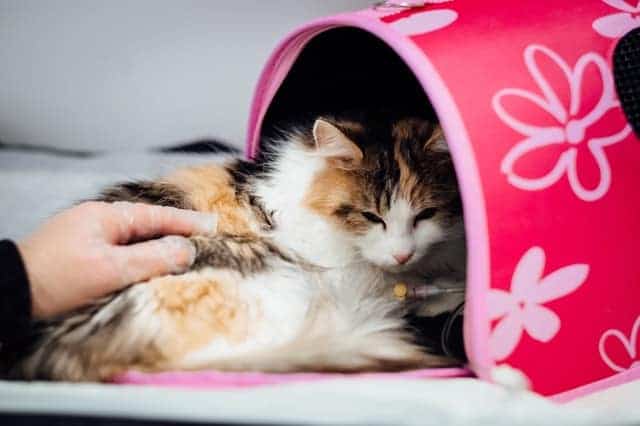
The cat has shortness of breath, a condition determined not necessarily by high temperatures. Let’s see what the main causes can be.
Anyone who lives with a cat knows how many noises and gestures this animal is able to make. Observing a cat throughout the day is truly fascinating, it is capable of making different movements and even different sounds with its mouth that we didn’t even know existed.
But when we are faced with shortness of breath is it right to worry? In fact, it could be a simple passing episode or the symptom of a more serious disorder not connected only to the respiratory system.
Because the cat has wheezing

As we have previously anticipated, the reasons why the cat has wheezing can be many, the important thing is to identify which of the many generates this condition in the animal.
If the cat shows breathlessness, in situations such as intense physical exercise, a wild run, a strong fright, a trip, excessive heat : in these cases the cat’s breathlessness will be temporary, so breathing will return to normal. Therefore, once the triggering cause has been stopped, there will be no more worry. Let’s see instead what are the causes for which the cat has wheezing and it is necessary to intervene.
Hairballs
It is now known how much the cat is an extremely clean animal, capable of spending whole days dedicating itself to the care of its body. They also have their tongue to their advantage, structured like a real cloth to remove old hair from your body.
In fact it is covered with rough protuberances that facilitate the cleaning and removal of the hair. Unfortunately, however, these small protuberances are not made to remove the fur towards the outside (the cat does not spit) and is therefore forced to swallow the hair just removed.
When this hair accumulates inside the stomach, the cat is forced to vomit it or do it in the needs, pulling out its own ball of hair, but when the animal is unable to do this, plugs are created that generate constipation in the intestine of the cat.
This is why if the cat does not have to carry out its needs for two days, it will be necessary to go to the vet, as in addition to generating this condition of wheezing, it also causes a real intestinal blockage.
Brachycephaly
Brachycephalic cats, or flat-nosed cats, need special attention. They are animals with a short muzzle and head, in fact in them there is a bone growth of the head in width, but not in length. This condition causes a series of alterations that obstruct the passage of air during breathing and consequently give clinical signs.
These cats have a hard time breathing, particularly in very hot weather, and immediately go out of breath after making a little effort, such as a run or the stairs. You need to pay close attention to brachycephalic cats and don’t be superficial in considering noisy breathing, fatigue and snoring as typical symptoms of the breed.
The breathing difficulties of these animals will tend to get worse year after year. Very easily and very quickly you will pass from a state of subclinical respiratory difficulty to very serious episodes of dyspnea.
Cold and shortness of breath
A cold for cats is a fairly common clinical condition, which can arise from situations of cold heat, lower temperatures, increased humidity, especially in the autumn and winter months. Events that can weaken the immune system and therefore make the onset of colds more likely.
Colds in cats are not caused by a Rhinovirus, as in humans, but are caused by Herpesvirus (more precisely we are talking about rhinotracheitis) and Calicivirus (calicivirosis). Which is why a good news, that we cannot pass our illness to the cat.
When the cat shows the typical symptoms of colds, it is advisable to go to your trusted veterinarian who will only need a physical examination to make the diagnosis and eliminate the primary cause for which the cat is wheezing.
As for the choriza, it is a very contagious viral disease, it is the combination of three different viruses and this very association of viruses that makes this disease so ferocious and difficult to fight. The effects are different, but all three affect the cat’s respiratory system.
In addition to shortness of breath, symptoms observed include: fever, loss of appetite, fatigue, nose drop, eye irritation and bad breath. Veterinarians strongly recommend the vaccine against this disease which can last for the entire life of the cat. Consult with your veterinarian to act in the best way.
Rhinotracheitis
Also rhinotracheitis in cats, like coriza is a very contagious viral disease and unfortunately also very common in cats, especially kittens. It is caused by herpesvirus, calicivirus, or both, and affects the upper respiratory tract. Rhinotracheitis is a serious disease and although treatable, it can even cause death in some cases.
Among the symptoms identified, in addition to causing coughing, sneezing and difficulty in ingesting water or food, it creates the cat wheezing. Depending on the seriousness of the situation, it is possible to intervene with specific care.
Generally it involves rehydrating the cat, enticing him to eat and giving him antibiotics. Remember that it is very important for the purpose of healing that the cat completes the treatment, without interrupting it even if you see enormous results.
Congestive heart failure
Wheezing and noisy breathing in cats can be caused by the accumulation of fluid in the lungs because the blood is not pumped properly from the heart. There are several causes that can lead to heart failure in cats, which is why at the slightest sign we recommend that you take your cat to a vet.
Feline Infectious Peritonitis (FIP)
Feline infectious peritonitis (FIP) is a deadly disease that cats and kittens suffer from, caused by a common virus called the feline coronavirus. Cats with FIP can suffer from: fluid buildup in the chest or abdomen (wet FIP) or lumps (granulomas) in their internal organs (dry FIP).
An excess of fluid in the abdomen, pericardium and pleura causes it, which in turn causes respiratory problems as well as fatigue and depression. A veterinarian will perform this test in order to make a diagnosis for a sick cat. As for the vaccine, it exists but several discussions about functionality are open.
Allergy and asthma
Among the causes of cat’s wheezing, allergies and asthma certainly emerge. Inhalation, in fact, of pollen, smoke or particular chemicals, give rise to allergies that cause nasal congestion combined with shortness of breath, itching, skin rashes, swelling of the limbs and loss of hair.
Once the allergens responsible for the reaction have been identified, it will be enough to intervene with antihistamines or steroids. Asthma, on the other hand, causes a noisy and labored breathing generated to eliminate excess mucus. It is caused by the presence of an irritant in the surrounding environment. Your vet recommends using an inhaler to help your cat breathe.
Feline heartworm disease
Heartworm disease is a disease caused by a filiform parasite that settles in the heart and pulmonary arteries of the cat. Very often it is confused with asthma or bronchitis but it is much more dangerous.
The symptoms found in addition to shortness of breath are: cough, chronic intermittent vomiting, weight loss and fatigue, which can sometimes lead to sudden death of the animal. in the presence of these conditions, contact your veterinarian immediately.






